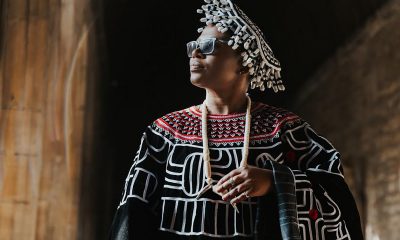World
Gay Nigerian priest makes religion serve LGBTQ people
Rev. Jide Macaulay founded House of Rainbow
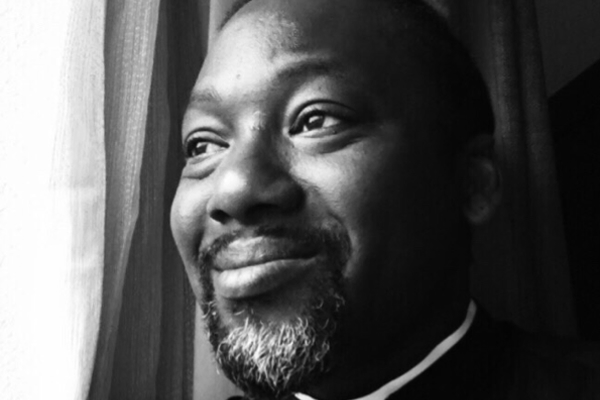
It is impossible to speak of queer identity and culture without acknowledging the important role religion has played in shaping it throughout history. Whether it’s Pope Francis praising the work an American priest has done to affirm LGBTQ identity, or a Republican legislator rebuking the existence of transgender people by invoking scripture from the Bible, religion and spirituality unquestionably influence conversations about sexual identity in the U.S. and how American society would like for people to manifest their sexuality.
A significant portion of LGBTQ people in the U.S. are religious.
A study the UCLA School of Law’s Williams Institute conducted in 2020 found that 5.3 million LGBTQ adults are religious with almost half of this metric identifying as “highly religious.” Forty percent of those between ages 18 and 35 are religious, and 65 percent percent of those over 65 identify as religious as well. In addition, 71 percent of Black LGBTQ adults in the U.S. are religious.
The Washington Blade recently spoke with Rev. Jide Macaulay, founder and CEO of the London-based House of Rainbow CIC, to talk about his work as a gay Black African Christian priest.
Macaulay was born in London and grew up in Ikeja, the boisterous capital of Nigeria’s Lagos State. He was born into a religious family to parents who he described to the Blade during a 2017 interview as “very dedicated Christians.” His father was one of Nigeria’s leading theologians, so Macaulay’s upbringing was naturally Christian-centric, with him being involved in the church from a young age.
As a budding adult, Macaulay pursued theology as a profession and became an ordained minister in 1998 after training with his father. After a two-year hiatus from the church, he joined the Metropolitan Community Church in London to study theology and later joined its congregation as a minister in 2003. Macaulay says it was there that he became confident in his understanding that “God loves gay people regardless of all these messages of it being a taboo or abomination.”
Sheathed with this conviction, Macaulay moved back to Nigeria to create an environment that mimics that which he had experienced at the Metropolitan Community Church.
“It became important to me to go to Nigeria to create the same space and tell LGBTQ people that ‘God loves you just the way you are,’” says Macaulay. “I embodied a lot of the spirit of the human rights church that came out of the origin of the Metropolitan Community Church.”
Macaulay started House of Rainbow under this ideology on Sept. 2, 2006. This weekly gathering of LGBTQ Christians initially began with 34 congregants, but the congregation grew rapidly to a point where Macaulay “didn’t know what to do with all the people.” He says the growth “perplexed” him as he didn’t realize that House of Rainbow was so popular.
House of Rainbow encountered problems that emanated from operating in a country with virulent homophobic laws, despite its popularity. Many congregants were physically attacked for identifying as queer, and Macaulay recalls individuals emerging to church with broken noses and arms. The media also caught wind of House of Rainbow’s weekly gatherings and chaos ensued.
The culmination of these events forced Macaulay to leave Nigeria after two years. House of Rainbow remained steadfast with its mission to create a community for LGBTQ Christians and soldiered on for a couple of more years before it eventually dissolved.
“It’s unfortunate, now, that as I speak to you we do not have a House of Rainbow community in Nigeria,” says Macaulay. “We still have people connected [to the community], but we don’t have a physical presence or anyone leading it.”
House of Rainbow’s reach has nevertheless now become global, with communities established in 22 countries. The majority of them are in Africa.
‘Homosexuality is not a sin; it is who we are’
The crux of Macaulay’s ideology centers on inclusion and acceptance. He creates a space at House of Rainbow where LGBTQ individuals can not only gather in community, but can also feel seen and recognized as meaningful members and contributors to Christianity
“The important thing [that people need to understand] is that as a minister of the gospel of Christ, I want every LGBTQ person to make [it to] heaven,” says Macaulay. “I want them to be on a path towards salvation and redemption.”
“This whole language that if you are gay, you are destined for hell and eternal damnation is so wrong. That is even abusive in itself,” adds Macaulay.
He further invokes a popular scripture that loosely states, “For all have sinned and fallen short of the glory of God.”
This scripture is a part of what homophobic Christians use to denounce queerness. Macaulay, nevertheless emphasizes that there is a lack of complete understanding of what the scripture truly communicates.
“[The scripture] didn’t say that anyone is going to hell. It said that we have all sinned and fallen short of the glory of God,” says Macaulay. “Having said that, it is important to understand that homosexuality is not a sin; it is who we are.”
Macaulay’s work is therefore enmeshed in the need to fight for social justice causes. He aims to use the church as a platform to bring awareness to and fight for all iterations of LGBTQ rights. Whether it be racism, sexism, or classism, Macaulay aims to “be like Jesus” and emulate his unwavering passion to uplift those at the bottom of society’s hierarchy.
“It’s inconceivable to think that any religious space wouldn’t be a platform for social justice. Jesus Christ was about social justice,” says Macaulay. “Even the Civil Rights Movement in America had the church fighting injustices relating to racism.”
Macaulay stresses that the church needs to “do what is right” and stand up for the rights of LGBTQ people.
“In the Bible in Micah 6:18, it says, ‘What does the Lord require of you but to do justice? To love kindness and work in humility with your God,” says Macaulay. “Therefore, Christian leaders need to have a strong understanding of justice.”
When reflecting on the current state of religion, its diversion from and/or weak approach towards social justice, and also its complicity in oppressing minority groups, Macaulay says, “Jesus Christ would definitely be mad.”
Can you be a gay African and Christian?
Prior to being colonized by European countries, many African cultures had relaxed attitudes towards sexuality and gender. The Shona in Zimbabwe, Pangwe in Cameroon, Igbo in Nigeria and other African tribes all permitted queer existence without any negative repercussions.
The expansion of European global influence brought with it homophobic laws, which were largely enacted under the pretense of “Christian values,” that forced African countries to institutionalize queerphobia, which has now become an undeniable legacy of colonialism on the continent.
That colonialism introduced African populations to Christianity is not an uncommon sentiment among queer Africans and Africans in general. Hence, it is not uncommon to find LGBTQ Africans who denounce Christianity not only because of its association with the racism that fueled European occupation of the continent, but also its functioning as a tool that erased what many of them nostalgically view as a queer-affirming past tainted by the arrival of the white man.
Macaulay both believes and shuns this. He acknowledges that colonialism did participate in the erasure of queer acceptance in African cultures, however, the concept of Christianity being “unAfrican” is fallacious.
He asserts that African and Black African Christians existed before colonialism, and thus, the notion that Christianity is the “white man’s religion” is a false notion.
“Christianity was present in pre-colonial Africa,” says Macaulay. “In the Bible there are numerous references to Africa, including Egypt and Ethiopia where important biblical events happened, [for example], the story of the Israelites leaving Egypt in search of the promised land.”
Macaulay, because of this, spotlights the need for religion to be decolonized.
By reframing how Christians conceive of religion, from unlearning the notion that Jesus is white to acknowledging the existence of Black people in the Bible, one can have a more wholesome and truthful interaction with Christianity.
Also, this will allow for queer African Christians to exist in their queer communities comfortably as Macaulay states that there’s a need for them to occupy space in the community as proudly religious people without bearing the shame that is cast on them by what seems to be an agnostic-leaning landscape.
Lil Nas X and ‘going to hell’
Lil Nas X on March 26 released a single titled “Call Me By Your Name” which garnered massive attention for both its musical mastery through a catchy hook and its depiction of Black queerness. The accompanying video further dramatized the story by drawing from Christian visual imagery of heaven and hell, and God and the Devil.
The song’s video features scenes of Lil Nas X in sensual form, including him giving a caricature of Satan a lap dance. This particularly angered many religious groups, including Christian allies of the LGBTQ community who USA Today reported criticized the video for “going too far to prove a point.’”
Macaulay is a fan of Lil Nas X, who he dubs as his “favorite artist of all time right now, after Michael Jackson,” and for him, Lil Nas X’s discography extends beyond simple displays of queer identity.
Macaulay has one thought at the forefront of his mind when he looks at “Call Me By Your Name”: The concept of hell is abusive and a form of scaremongering.
“The concept of hell is propaganda. It is almost fictional,” says Macaulay. “The idea that if you do something wrong you will go to hell, is wrong in and of itself. Homosexuality was never wrong. Homophobia is wrong.”
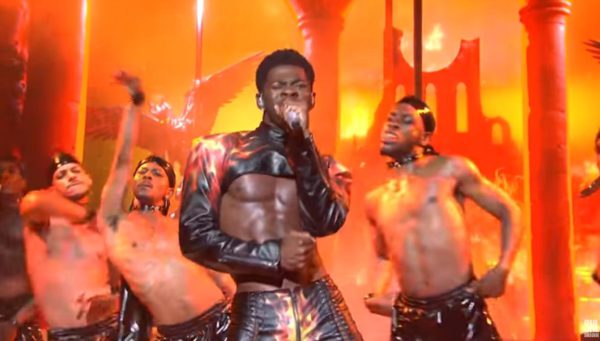
He further underlines that God made gay people, and supports this with a scripture from the book of Philippians which loosely points to God’s omnipotent knowledge before, during, and after one’s life on earth.
Macaulay says that people should listen to Lil Nas X’s pain, and not rebuke him, because he speaks for millions of gay people.
“The reality is that when you tell people that they are going to hell, you are excommunicating them from living their own lives appropriately,” says Macaulay.
Macaulay nonetheless has a deep admiration for today’s younger generations, especially because they refuse to align themselves with the bigotry that ravages societal discourse about identity.
“I’m really glad for the young people that have stepped out. They are fighting back. They are the warriors and heroes saying, ‘Enough is enough. I’m proud, queer and African,’” says Macaulay. “I think that the sad reality for the Christian community is that they’re missing out on the gift and talents of the queer community [by being exclusive].”
Macaulay and House of Rainbow have created “GAYMoment,” a weekly online service that centers queer worship. Each Sunday, queer people from around the world gather online for prayer, sermon, and testimonies, all provided by queer people.
Macaulay champions sex positivity
Discussing sex and sexual identity is a topic from which Macaulay does not shy away. In fact, it is one that although he is a religious leader, he also approaches as a person of faith.
Macaulay, who lives with HIV, is a proponent of sex positivity.
“I think it’s important for every adult human being to experience a sexual relationship that is appropriate, suitable, and consensual,” says Macaulay. “It is important that everyone in their lifetime engages positively with sex, particularly adults. I don’t recommend it for minors though.”
Macaulay is also a vocal advocate for having honest and open conversations about sex and sexuality. He gives credence to the fact that society needs to address the lack of comprehensive sex education.
“Countries that have [addressed sex education] are doing better. They have less cases of STIs and teenage pregnancies,” says Macaulay. “Also, students get more opportunities to know more about various sexulities.”
Sex education should be age-appropriate and geared towards protecting children, minors, and vulnerable adults, says Macaulay. He believes that children should know about their bodies and be armed with the confidence to talk to adults when their boundaries are violated.
Thus, by keeping advocacy as the focal point, Macaulay, who is affectionately known as “Mama Jide” functions in a quintessential role in the queer community, one similar to that of house mothers in ballroom culture who outstretch themselves to the limits to ensure that their children not only have their basic needs, but also reach a point of complete self-actualization and realization of their purpose in life.
El Salvador
#JusticiaParaKarla: una lucha por el derecho a la identidad en El Salvador
Karla Guevara inició su camino legal y personal en 2020
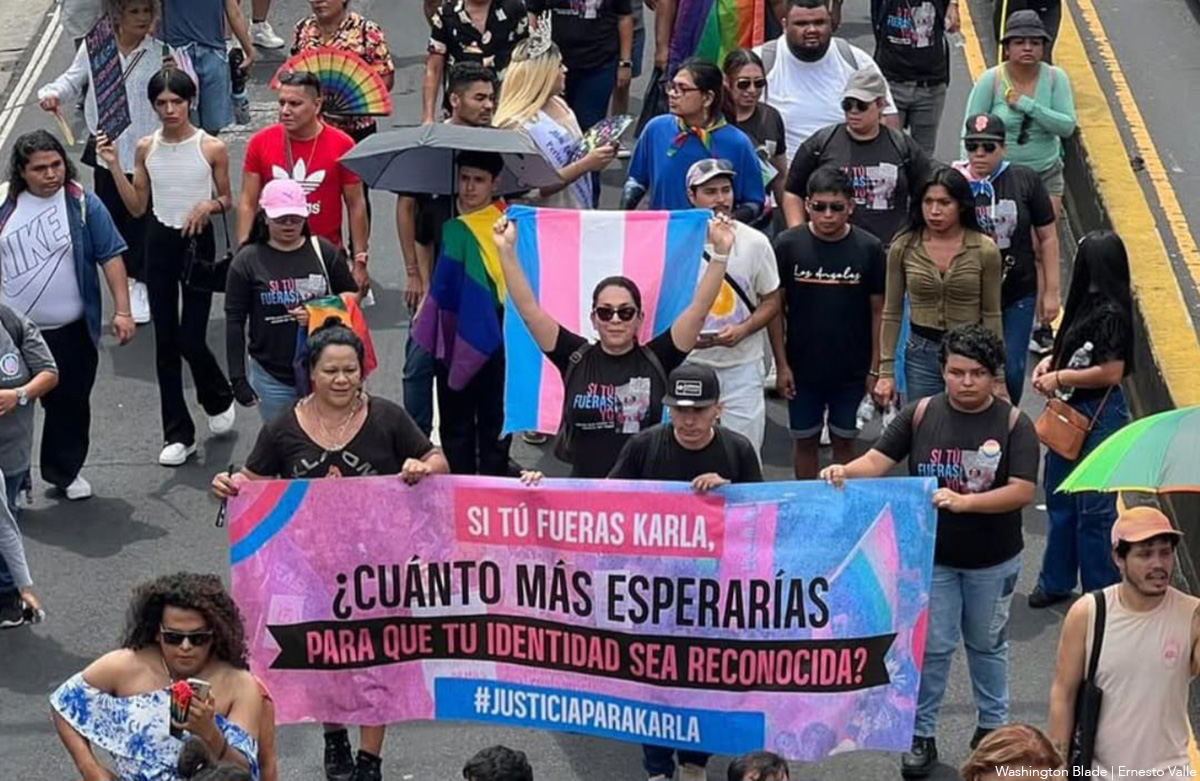
Cinco años han pasado desde que Karla Guevara inició un camino legal y personal para lograr que su nombre y género sean reconocidos en su Documento Único de Identidad (DUI). Cinco años de sentencias, apelaciones, puertas cerradas y vulneraciones que hoy se resumen en una sola palabra: resistencia.
En medio de un país que aún arrastra estructuras jurídicas y sociales poco sensibles a las realidades trans, Guevara se ha convertido en una voz visible. No solo por la denuncia pública de su caso, sino por su capacidad de transformar el dolor en acción: ha iniciado la campaña #JusticiaParaKarla, la cual acompaña con conversatorios llamados “Si tú fueras yo” en diferentes zonas del país.
Su historia se remonta al año 2018, cuando, junto a otras tres defensoras de derechos humanos —Mónica Hernández, Bianca Rodríguez y Verónica López— interpuso una demanda para lograr el cambio de nombre legal. La acción se inspiró en la Opinión Consultiva 24/17 de la Corte Interamericana de Derechos Humanos, que obligó a los Estados miembros de la OEA a garantizar los derechos de las personas trans, incluyendo el reconocimiento de su identidad.
A diferencia de sus compañeras, cuyo proceso fue resuelto favorablemente, Guevara fue la única a quien el Estado salvadoreño le negó el derecho, incluso tras contar con una sentencia favorable. El camino ha sido empinado, desgastante y doloroso, y ha implicado múltiples etapas legales con resoluciones contradictorias.
El 8 de enero de 2020, el juzgado declaró su demanda improponible. Guevara apeló el 22 de ese mismo mes, pero la Cámara de Familia desestimó su recurso. Aun así, perseveró. En abril de 2021 presentó una segunda apelación, y en septiembre se revocó la decisión del juzgado, ordenando admitir su demanda. Una pequeña luz parecía abrirse.
En agosto de 2022, después de varios peritajes que, según Guevara, incluyeron momentos donde se sintió expuesta y violentada, recibió una sentencia favorable: se autorizaba su cambio de nombre y género en la partida de nacimiento. Sin embargo, esta victoria fue parcial y breve. Aunque se ordenó marginar su partida, no se ordenó cancelarla como en otros casos similares.
El 4 de octubre de ese mismo año, la sentencia fue enviada al Registro del Estado Familiar. Pero la respuesta institucional fue sorprendente: el 3 de noviembre, la Alcaldía de San Salvador se negó a realizar el cambio. El jefe del registro y el registrador presentaron un amparo ante la Sala de lo Constitucional, paralizando el proceso.
“No solo me lo negaron, sino que ahora me exponen a un juicio aún mayor”, expresa Guevara. La frustración y la indignación fueron creciendo. En febrero de 2023, presentó una denuncia ante la Fiscalía General de la República, aunque lo hizo con poca esperanza. “Temía que no harían nada”, dijo. Y el 16 de abril de 2024, sus temores se confirmaron: la Fiscalía archivó el caso alegando que “no existe delito que perseguir”.
El 19 de noviembre de ese mismo año, Guevara decidió acudir a instancias internacionales y presentó su caso ante la Comisión Interamericana de Derechos Humanos. La CIDH ya notificó al Estado salvadoreño y le otorgó un plazo de cuatro meses para responder por qué no ha ejecutado el cambio ordenado por el juzgado.
“Obviamente no van a dar respuesta”, lamenta Guevara. Lo dice con la voz entrecortada, como quien ya ha llorado mucho, pero no ha perdido la voluntad de hablar. Reconoce que el proceso le ha afectado emocionalmente. “Cada vez que hablo de esto se me corta la voz”.
Las heridas no solo vienen de las oficinas estatales, sino también de las calles. Las miradas, los comentarios, el momento de presentar el DUI en cualquier trámite. “Es como si cada vez tuviera que explicar mi existencia. Es un juicio constante sobre quién soy”.
Guevara no está sola. Reconoce que hay otras personas trans en la misma situación. “Lo preocupante es que solo pasa en algunas zonas del país. En otras ha habido casos exitosos”, afirma. La disparidad en el trato revela una preocupante arbitrariedad institucional.
Uno de esos casos exitosos es el de Valeria Mejía, coordinadora de monitoreo y evaluación de ASPIDH. Su DUI ya refleja su nombre identitario, aunque no su género.
“Cuando recibí mi DUI con el nombre que me identifico pensé: aquí empieza una nueva vida”, relata.
Para Mejía, el cambio fue profundamente simbólico. “Uno ve pasar toda su vida frente a los ojos. Toda la discriminación, todos los rechazos. Sentí que algo sanaba”. A pesar de ello, su género asignado al nacer sigue apareciendo en el documento, lo que le genera inseguridad.
“El problema es que tengo que ir a todas las instituciones donde aparezco con mi nombre anterior. En el Seguro Social, por ejemplo, aún estoy registrada con el nombre masculino y no pueden atenderme, aunque el número del DUI sea el mismo”, explica.
Casos como los de Guevara y Mejía visibilizan una problemática estructural: el Estado salvadoreño no garantiza de forma uniforme el derecho a la identidad de las personas trans. Las resoluciones favorables son solo el primer paso. Su implementación efectiva aún tropieza con prejuicios, burocracia y omisiones.
Con la campaña #JusticiaParaKarla, la activista busca más que una solución a su caso personal. Busca generar conciencia, exigir coherencia legal y empujar una transformación cultural. En la marcha del 17 de mayo contra la LGBTIfobia, su presencia se hizo notar con camisetas, banners y mensajes que interpelan directamente al sistema.
Guevara ha hecho de su cuerpo, su voz y su historia una herramienta de resistencia. En cada conversatorio de “Si tú fueras yo”, invita a imaginar, a empatizar, a incomodarse.
“Lo que me pasa a mí le puede pasar a cualquier persona trans. Y si el Estado no nos reconoce, nos niega también la posibilidad de existir plenamente”, expresa.
Hoy, la resolución está en manos de la CIDH y el tiempo corre. La lucha de Guevara ya no es solo por una partida de nacimiento. Es por el derecho a ser, a vivir sin miedo, a que el nombre que la representa no siga siendo un motivo de juicio, burla o rechazo.
Mientras tanto, sigue esperando. Sigue alzando la voz. Sigue sembrando esperanza en quienes vienen detrás. Porque como ella misma dice: “Esto no se trata solo de mí. Se trata de justicia”.
China
Female writers arrested in Chinese crackdown on gay erotic fiction
Pingping Anan Yongfu arrested last month, detailed ordeal on Weibo

On China’s Weibo, a platform akin to a digital town square, a young woman using the handle Pingping Anan Yongfu laid bare a harrowing ordeal. She was arrested and subjected to a humiliating strip search for publishing gay erotic fiction. Her raw and unsparing account exposed a broader clampdown.
Since February, at least 30 other writers — mostly women in their 20s — have shared similar stories of law enforcement raids, their lives upended for crafting “danmei,” a genre of male-male romance often laced with explicit themes, on Haitang Literature City and other platforms.
”I will never forget it — being escorted to the car in full view,” posted Pingping. “Enduring the humiliation of stripping naked for examination in front of strangers, putting on a vest for photos, sitting in the chair, shaking with fear, my heart pounding.”
A wave of legal limbo engulfs the writers, with many released on bail or awaiting trial, their fates uncertain, according to a BBC. Others remain behind bars, their detention a stark reminder of the crackdown’s reach.
Beyond those arrested, a broader net has been cast: scores of contributors to Haitang Literature City have been hauled in for interrogations, their online words now a potential liability under China’s pornography laws for producing and distributing obscene materials.
China’s pornography laws cast a long shadow over writers, with those profiting from their work facing prison terms exceeding a decade for crafting “explicit descriptions of gay sex or other sexual perversions.” Yet, heterosexual erotica often escapes such scrutiny, slipping through the cracks of enforcement. Nobel Laureate Mo Yan, whose novels brim with graphic sexual scenes, and Jia Pingwa, known for vivid depictions in works like “Abandoned Capital,” and other acclaimed writers continue to publish freely, their books lining shelves without fear of raids. This stark disparity underscores a selective crackdown, where gay erotica bears the brunt of official censure.
Beijing’s unease with the online outcry was palpable, as the trending hashtag #HaitangAuthorsArrested, which amassed more than 30 million views on Weibo, vanished abruptly under censorship’s heavy hand. Posts offering legal advice to the embattled writers were scrubbed, and a detailed report on the crackdown by Caixin, a leading Chinese news outlet, was swiftly taken offline. Writers’ accounts, including some of their pseudonymous handles, have also begun to disappear, erased from the digital landscape as authorities tighten their grip.
As her post ricocheted across China’s digital sphere, Pingping abruptly deleted it, replacing it with a brief message expressing gratitude to supporters while conceding she had broken the law. The admission, tinged with resignation, marked her final act on Weibo before she erased her account entirely, vanishing from the platform amid mounting pressure from authorities.
“Danmei,” a vibrant subgenre of Chinese fiction, centers on romantic and often sexually explicit relationships between men, captivating a largely female readership through its blend of emotional depth, fantasy, and forbidden desire. Rooted in Japanese “yaoi” or “boys’ love,” but distinctly shaped by Chinese cultural sensibilities, it flourishes on Haitang Literature City and JJWXC and other platforms where writers craft sprawling tales of historical, fantastical, or modern love that often laced with themes of power and sacrifice.
Despite its popularity — bolstered by blockbuster adaptations like “The Untamed,” which amassed millions of fans — “danmei” faces intense scrutiny in China, where authorities deem its explicit content “obscene” under vague pornography laws. This tension reflects a broader cultural clash: while “danmei” offers a space for exploring queer identities and challenging traditional gender norms, its underground allure draws both devoted fans and the wary eye of censors seeking to uphold conservative values.
A sweeping crackdown in late 2024 saw Chinese authorities prosecute roughly 50 “danmei” writers, ensnaring them in a legal dragnet under the country’s 2004 obscenity laws. Among them, Yuan Shang Bai Yun Jian, a prominent author who earned 1.85 million yuan ($250,874.58) from her work on Haitang Literature City, was sentenced to nearly five years in prison, her success weaponized as evidence of “obscene materials for profit.”
The harsh penalties, which outstrip those for some violent crimes, sparked outrage online, with netizens decrying the disproportionate punishment for crafting stories that, while explicit, harmed no one.
Chinese media regulator banned ‘danmei’ TV dramas in 2022
Humiliation washed over Pingping as law enforcement stormed into her college classroom, recounted a writer using the Weibo handle “Tianxia Ju Da Bingyuan” or “The World Is a Vast Asylum.” Dragged from her lecture under the stunned gazes of her peers, she endured a public spectacle as officers trailed her to her dormitory, rifling through her belongings in a search for evidence of her “danmei” stories, leaving her exposed and her privacy shattered.
“Danmei” novels, centered on male-male romance have spurred numerous Chinese television dramas, but state censorship has sharply reduced their output. A 2021 Sixth Tone report identified more than 60 “danmei”-based dramas in development or slated for release, involving actors who include Chen Feiyu and Fan Chengcheng. Many of them, however, were halted following the 2022 National Radio and Television Administration ban on such adaptations.
MyDramaList records 16 aired series, including “The Untamed” (2019) and “Word of Honor” (2021), each with 30–50 actors, totaling approximately 480–800 performers. Lead actors, including Xiao Zhan and Wang Yibo, earned $1–3 million per series, per The China Project, while others made $50,000–$100,000, though precise figures remain limited due to private contracts. The 2021 “Internet Clean-up Campaign” and continued restrictions have significantly curbed new “danmei” adaptations.
United Nations
UN Human Rights Council extends LGBTQ rights expert’s mandate
29 countries voted for resolution

The U.N. Human Rights Council on Monday extended the mandate of the United Nations’ independent LGBTQ rights expert for another three years.
The resolution passed with 29 countries (Albania, Belgium, Bolivia, Brazil, Bulgaria, Chile, Colombia, Costa Rica, Cuba, Cyprus, the Czech Republic, the Dominican Republic, France, Georgia, Germany, Iceland, Japan, Kenya, the Marshall Islands, Mexico, the Netherlands, North Macedonia, South Korea, Romania, South Africa, Spain, Switzerland, Thailand, and Vietnam) voting for it and 15 countries (Algeria, Bangladesh, Burundi, China, Cote d’Ivoire, Democratic Republic of Congo, Ethiopia, Gambia, Indonesia, Kuwait, Malawi, Maldives, Morocco, Qatar, and Sudan) voted against it.
Benin, Ghana, and Kyrgyzstan abstained.
The U.S. in February withdrew from the Human Rights Council. The Trump-Pence administration in 2018 pulled the U.S. from it. The U.S. in 2021 regained a seat on the Human Rights Council.
Graeme Reid has been the UN’s independent LGBTQ rights expert since 2023. The South African activist, among other things, previously ran Human Rights Watch’s LGBT Rights Program.
-

 Sports5 days ago
Sports5 days agoTrans cyclist’s victory sparks outrage in conservative media
-

 Israel5 days ago
Israel5 days agoActivist recalls experience in Tel Aviv after Israel-Iran war began
-

 Congress5 days ago
Congress5 days agoCongress passes ‘Big, Beautiful Bill’ with massive cuts to health insurance coverage
-
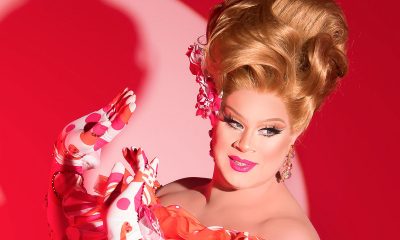
 Celebrity News5 days ago
Celebrity News5 days agoNina West’s ‘Sugar in the Tank’ tour comes to Rehoboth Beach



